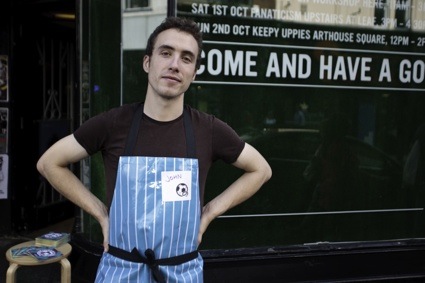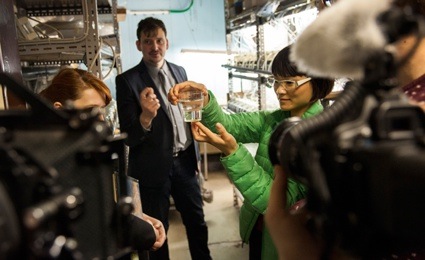In the early 19th century, textile artisans started to break into factories at night to destroy the new labour-saving machines that their employers had bought. They saw the stocking frames, spinning frames and power looms as a threat that would make their skills obsolete and lead to lower wages.
The movement began in Nottingham on 11 March 1811 and spread throughout England over the following two years. The artisans who opposed the newly introduced machinery were called the Luddites. The origin of the name is uncertain but over time, the term “Luddite” came to describe people opposed to any form of technological progress. In the late 21st century, the neo-luddites emerged. They protest(ed) against the negative impact that technology has on individuals, their communities and the environment and aspire to a return to a ‘simple lifestyle’.
 17 year old Austin Haughwout was assaulted on a Connecticut beach by a woman upset about his use of a drone
17 year old Austin Haughwout was assaulted on a Connecticut beach by a woman upset about his use of a drone
Newspapers suggest that society is now facing the rise of a new type of neo-luddites. They don’t fear for their jobs or for any damage to the ecology, they fear the loss of privacy brought about by drones and google glasses. In any case, the smartest form of luddism or neo-luddism is not one that commends violence, it’s one that calls for a better understanding of new technologies and demands that people (all of them not just the ones who can afford to buy these technologies) have a voice in how they are to be distributed and used.
Speculative designer Lisa Ma, however, is pushing the discussion further. Over the past few month, she has been looking for the relevance of Luddism in the modern era by shifting focus from digital and communications technologies to the innovations of biotechnology industries. These biotechnologies which have started to pervade the food, health and ecological systems will undoubtedly attract their own forms of luddism. So who are the BioLuddites? Where are the group and individuals who ask for a demystification of biotechnologies and who are calling for a public debate about GMOs, systems ecology, hormone replacement, etc?
She writes:
“Biotechnology, its beaucrocies, peripheries and implementation affect our everyday lives. There is a lot of work on the public engagement of emerging technologies, but there are gaps between where we believe science should cover and what is not yet covered. The recent ebola outbreak is an example of where the epidemic is actually one of fear, as society comes face to face with and area not yet solved by biotechnology or policy.
In digital technologies, we’ve seen an emergence of e-etiquettes and social manuals etc. of digital behaviour. These are what we refer to when society reaches the inner and outer limits of digital technology. Similarly, we also need guidances to reform our social relationships with biotechnology. Bioluddites is filling a necessary role in guiding the social and not just the ethical critiques of biotechnologies.”
As part of her residency at Near Now, a programme which works closely with artists and designers to produce projects that explore the place and impact of technology in everyday life, Lisa Ma organised a panel titled Where are the Luddites – An Open Call for BioLuddites. The event took place on 4th June 2014, in Nottingham, birth place of the Luddite movement.
 John O’Shea (photo)
John O’Shea (photo)
 Lisa Ma
Lisa Ma
 unMonastry
unMonastry
Taking part in the discussion were Lisa Ma, Ben Vickers, David King and John O’Shea.
John O’Shea gave a compelling talk about his very funny adventures in proposing the implementation of a Meat Licence, and in bio-engineering a Pigs Bladder Football. Both are projects that catches the imagination of the public but the artist also discussed the legal, ethical and cultural questions that arose during the development of the works.
David King, who has a PhD in molecular biology, is the founder and Director of Human Genetics Alert, the founder of Luddite 200, and of the Breaking the Frame conference. He is also a frequent contributor to media debates on genetics and it is clear from his contribution to the panel that he has some strong and thought-provoking opinions about synthetic biology, three-parent babies, the need to engage in a dialogue with the powerful systems that control biotechnological innovations, etc.
Ben Vickers is a curator, writer, technologist and self-proclaimed Luddite. He talked about the functioning of unMonastery, a space that aims to develop a new kind of social space, akin to co-living and co-working spaces, drawing influence from both Monasteries and HackerSpaces, with a focus on the process of co-creation and co-learning between the community and unMonasterians. He is also a NearNow fellow.
An Open Call for BioLuddites was a great event and i can’t recommend enough to watch the video of the panel:
Image on the homepage via BBC news.
